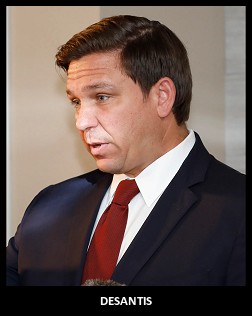 Last week, Florida's Republican Governor, Ron DeSantis, announced that he would legally challenge a federal court decision that would, with the exception of those convicted for murder or sexual offenses, permit most former felons in the state to register to vote prior to the November 3rd Presidential Election. "It will go to the 11th Circuit," DeSantis said, adding in Trump-like language: "We will see what happens."
Last week, Florida's Republican Governor, Ron DeSantis, announced that he would legally challenge a federal court decision that would, with the exception of those convicted for murder or sexual offenses, permit most former felons in the state to register to vote prior to the November 3rd Presidential Election. "It will go to the 11th Circuit," DeSantis said, adding in Trump-like language: "We will see what happens."
The good news is that, at least with respect to the U.S. 11th Circuit Court of Appeal, the chances that DeSantis will prevail can be rated at somewhere between slim and none. The bad news is that, even with the benefit of U.S. District Court Judge Robert L. Hinkle's erudite 125-page decision in Jones v. DeSantis, the voting rights organization plaintiffs (League of Women Voters and the NAACP) may find it extraordinarily difficult to register those otherwise eligible former felons in time to cast a vote in the upcoming General Election due to the adverse impact of COVID-19.
But, as to the good news for the moment, a statute that may appear constitutional on its face can then be rendered unconstitutional by the manner in which it has been applied by a state agency. The background and the history of this case, as well as Judge Hinkle's "as applied" reasoning, help to explain why his decision will likely be upheld by the 11th Circuit...
Background
As Judge Hinkle concedes, states have the Constitutional authority to permanently strip all convicted felons of their right to vote. If a state decides to reinstate felon voting rights, however, the method of reinstatement must comply with the Constitution. For example, the court noted, a state cannot restore voting rights for white felons; yet deny them to African-American felons.
Florida's history of disenfranchising felons for life dates back to an 1849 statute. It continued unabated in the Sunshine State until Jan. 18, 2019, the effective date of Amendment 4 to the FL Constitution --- a statewide ballot initiative that was approved by 64.55% of FL voters. Except with respect to those who were convicted of murder or sexual offenses, Amendment 4 restored the right of former felons to vote "upon completion of all terms of sentence including parole or probation."
Without the support of a single Democrat, Republicans in the FL legislature at the direction of the Governor, passed and DeSantis signed into law SB7066, a statute that defined "completion of all terms of sentence" to include full payment of all Legal Financial Obligations (LFOs), to wit: "fines, fees, costs and restitution."
In June 2019 Kelvin Jones, a former felon, challenged the constitutionality of SB7066. Multiple cases were joined with this one, bringing the total number of individual plaintiffs to 17.
On Oct. 18, 2019, Judge Hinkle issued a preliminary injunction [PDF], finding that SB7066 violated the Equal Protection Clause of the 14th Amendment with respect to the 17 individual plaintiffs, who had a genuine inability to pay the LFOs and were, thus, blocked by the new law from being allowed to register and vote.
As his appeal to the U.S. 11th Circuit Court of Appeal was pending, DeSantis sought and obtained an Advisory Opinion from the FL Supreme Court. The Court agreed with DeSantis that Amendment 4's words "all terms of sentence" included "fines, fees, cost and restitution." Judge Hinkle noted in his latest ruling that the FL Supreme Court did not address the word "completion" (as in "upon completion of all terms of sentence including parole or probation.") because DeSantis had not asked it to do so. That, Hinkle noted, was a critical omission because "completion" could entail "payment to the best of a person's ability."
On Feb. 19th of this year, a three-judge 11th U.S. Circuit Court of Appeals panel unanimously upheld Judge Hinkle's preliminary injunction. The appellate court ruled that the FL policy was unconstitutional as it applied to former felons who lacked the ability to pay. It also suggested that if further development of the record revealed that most former felons could not pay, SB7066 could not be lawfully applied to the entire class of felons, and not just the 17 named plaintiffs.
Subsequently, Gov. DeSantis' request for an en banc (full court) review of the three-judge panel decision was summarily denied by the full 11th Circuit.
Judge Hinkle's ruling last week was based on the content of the 11th Circuit's prior ruling. The 11th Circuit subjected the statute to a test greater than the minimal rational basis level of scrutiny for determining whether the new law violated the U.S. Constitution with respect to felons who lacked the ability to pay LFOs. The appellate court suggested that the FL statute could not survive even the lower rational basis standard if the record exposed greater flaws than were exposed by declarations filed in support of the original preliminary injunction.
Judge Hinkle's latest ruling comes only after the record was further developed during 8 days of trial proceedings earlier this year. That comprehensive trial record allowed Judge Hinkle to expressly find that most former felons lack the funds to pay LFOs --- a finding that comes as no surprise in light of the Sunshine State's Scrooge-like system of "cash register justice", that, from the time of arrest to the end of incarceration, piles on fee-upon-fee for just about everything received while behind bars --- even for in-prison medical care --- that all but a fortunate few are left destitute when they finally leave prison. The trial record also revealed a significant reason why the 11th Circuit will likely uphold Judge Hinkle's decision to overturn SB7066. The court found that the statute has been unconstitutionally applied by an understaffed and dysfunctional FL Division of Elections...
Straight out of Kafka
At the outset of his decision, Judge Hinkle laid out the astounding problem the trial had exposed about Florida's system of "cash-register justice"...
The State is on pace to complete its initial screening of the citizens by 2026, or perhaps later, and only then will have an initial opinion about which citizens must pay, and how much they must pay. In the meantime, year-after-year, federal and state elections will pass. The uncertainty will cause some citizens who are eligible to vote, even on the State's own view of the law, not to vote, lest they risk criminal prosecution.
It is one thing for the Legislature or the FL Supreme Court to say that a former felon must fully pay any LFOs before registering to vote; quite another to ask someone who believes they don't owe anything to risk felony prosecution as a price for deigning to register to vote pursuant to Amendment 4. The State does not maintain a database for LFOs, and, as the court observed: "Even with a team of attorneys and unlimited time, the State has been unable to show how much each plaintiff must pay to vote under the State's view of the law."
Most former felons don't know they need to obtain the original judgment to ascertain the existence of an LFO. Sometimes such records no longer exist, and even when they do, discrepancies in the state's records prevent accurate calculations.
The court was especially troubled by Florida's "staggering inability to administer the system" --- an inability that "renders the pay-to-vote system...irrational." Indeed, except with respect to the 17 named plaintiffs, during the 18 months that had transpired between passage of Amendment 4 and the trial, the understaffed FL Division of Elections had failed to screen so much as one of the 85,000 pending registrations submitted by former felons. At the current rate, per the court, screening may not be completed until 2030.
As a result, in addition to the previously sustained finding that the state was denying Equal Protection, Judge Hinkle based his injunction upon the system's obvious denial of due process that flows from Florida's Kafkaesque administrative system for former felon voter registration.
Judge Hinkle also found the LFOs to be a poll tax in violation of the Constitution's 24th Amendment. It would not be unreasonable for FL to contest the poll tax finding, but even if the 11th Circuit overturned the poll tax finding, it would not alter the outcome of the case. The due process violation that arises from Florida's Kafkaesque administrative system, as applied, would be sufficient to strike down the statute under the standards set forth by the 11th Circuit in its prior ruling.
Appropriate remedy
Judge Hinkle carefully designed his remedy to protect those seeking to register from the threat of future voting-related felony prosecution. According to his ruling...
A person who acts in accordance with an advisory opinion or who has acted in reliance upon the Division's failure to provide an advisory opinion within 21 days may not be prosecuted.
The injunction includes a rebuttal presumption that the former felon is unable to pay the LFO. The presumption can be rebutted only if the State discloses the amount of the LFO owed.
It is likely the 11th Circuit would find these remedial actions quite reasonable given the irrationality of a system that the Governor appears to have purposely designed to defeat the will of the voters as expressed in their overwhelming 2018 passage of Amendment 4. (The author expresses no opinion on whether the stolen right-wing majority on the U.S. Supreme Court, should this case eventually reach it, might ignore that irrationality and intervene to preserve GOP voter suppression in the Sunshine State.)
UPDATE, 7/1/20: 11th Circuit Court of Appeal granted DeSantis' to expedite his appeal of Judge Hinkle's decision, providing a briefing schedule and setting oral arguments for August 10. On June 14, Judge Hinkle denied the Governor's motion for a stay of the injunction pending the appeal. However, the 11th Circuit subsequently granted a stay and en banc review, which does not bode well for felon voting in FL this year.
 Ernest A. Canning is a retired attorney, author, and Vietnam Veteran (4th Infantry, Central Highlands 1968). He previously served as a Senior Advisor to Veterans For Bernie. Canning has been a member of the California state bar since 1977. In addition to a juris doctor, he has received both undergraduate and graduate degrees in political science. Follow him on twitter: @cann4ing
Ernest A. Canning is a retired attorney, author, and Vietnam Veteran (4th Infantry, Central Highlands 1968). He previously served as a Senior Advisor to Veterans For Bernie. Canning has been a member of the California state bar since 1977. In addition to a juris doctor, he has received both undergraduate and graduate degrees in political science. Follow him on twitter: @cann4ing


 Trump Admin's Endless Waste, Fraud, Abuse on Voting, at DOJ, by DOGE: 'BradCast' 1/20/26
Trump Admin's Endless Waste, Fraud, Abuse on Voting, at DOJ, by DOGE: 'BradCast' 1/20/26 'Green News Report' 1/20/26
'Green News Report' 1/20/26
 Sunday 'Domestic Terrorist' Toons
Sunday 'Domestic Terrorist' Toons 'A Cornered Rat is a Dangerous Rat': Trump Terrorizes Minn., Menaces NATO, World: 'BradCast' 1/15/26
'A Cornered Rat is a Dangerous Rat': Trump Terrorizes Minn., Menaces NATO, World: 'BradCast' 1/15/26 'Green News Report' 1/15/26
'Green News Report' 1/15/26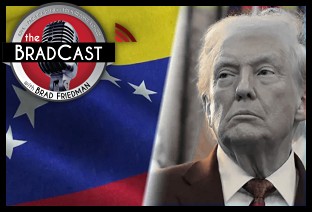 'This Isn't Close to Over': Mad King Trump in Venezuela (and Beyond): 'BradCast' 1/14
'This Isn't Close to Over': Mad King Trump in Venezuela (and Beyond): 'BradCast' 1/14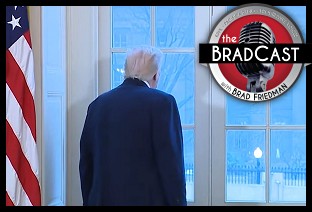 Things Getting Weirder as Trump Keeps Losing: 'BradCast' 1/13/26
Things Getting Weirder as Trump Keeps Losing: 'BradCast' 1/13/26 'Green News Report' 1/13/26
'Green News Report' 1/13/26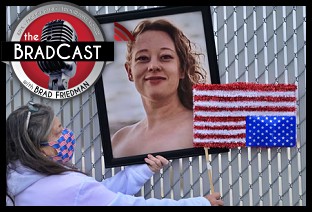 After ICE Murder in MN, Local Cops Disown Fed Policing Practices: 'BradCast' 1/12/26
After ICE Murder in MN, Local Cops Disown Fed Policing Practices: 'BradCast' 1/12/26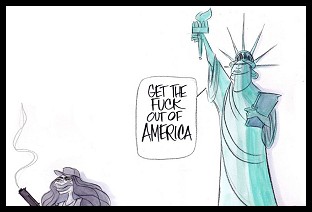 Sunday 'Ice Age' Toons
Sunday 'Ice Age' Toons 'Green News Report' 1/8/26
'Green News Report' 1/8/26 Trump to Congress, Climate, U.N., Rule of Law: DROP DEAD - 'BradCast' 1/8/26
Trump to Congress, Climate, U.N., Rule of Law: DROP DEAD - 'BradCast' 1/8/26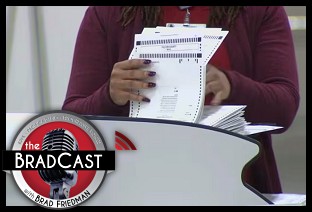 'Nonsense': Trumpers Claim 315k Fraudulent GA Votes in 2020: 'BradCast' 1/7/26
'Nonsense': Trumpers Claim 315k Fraudulent GA Votes in 2020: 'BradCast' 1/7/26 Jack Smith Testimony on Trump J6 Crimes, DOJ Weaponization: 'BradCast' 1/6/26
Jack Smith Testimony on Trump J6 Crimes, DOJ Weaponization: 'BradCast' 1/6/26 Trump War on Venez. is About Ego, Power, 'Alien Enemies Act': 'BradCast' 1/5/26
Trump War on Venez. is About Ego, Power, 'Alien Enemies Act': 'BradCast' 1/5/26 Have a Holly Jolly Somehow
Have a Holly Jolly Somehow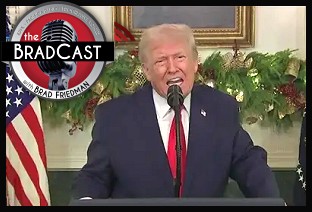 Old Man Shouts at People from WH for 20 Minutes: 'BradCast' 12/18/25
Old Man Shouts at People from WH for 20 Minutes: 'BradCast' 12/18/25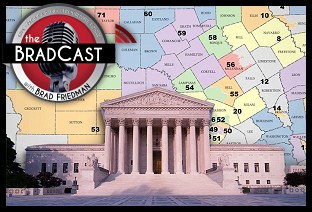 SCOTUS' How-To on Gerrymandering on 'Eve' of Election Year: BradCast' 12/17/25
SCOTUS' How-To on Gerrymandering on 'Eve' of Election Year: BradCast' 12/17/25 Bricks in the Wall: 'BradCast' 12/16/25
Bricks in the Wall: 'BradCast' 12/16/25
 VA GOP VOTER REG FRAUDSTER OFF HOOK
VA GOP VOTER REG FRAUDSTER OFF HOOK Criminal GOP Voter Registration Fraud Probe Expanding in VA
Criminal GOP Voter Registration Fraud Probe Expanding in VA DOJ PROBE SOUGHT AFTER VA ARREST
DOJ PROBE SOUGHT AFTER VA ARREST Arrest in VA: GOP Voter Reg Scandal Widens
Arrest in VA: GOP Voter Reg Scandal Widens ALL TOGETHER: ROVE, SPROUL, KOCHS, RNC
ALL TOGETHER: ROVE, SPROUL, KOCHS, RNC LATimes: RNC's 'Fired' Sproul Working for Repubs in 'as Many as 30 States'
LATimes: RNC's 'Fired' Sproul Working for Repubs in 'as Many as 30 States' 'Fired' Sproul Group 'Cloned', Still Working for Republicans in At Least 10 States
'Fired' Sproul Group 'Cloned', Still Working for Republicans in At Least 10 States FINALLY: FOX ON GOP REG FRAUD SCANDAL
FINALLY: FOX ON GOP REG FRAUD SCANDAL COLORADO FOLLOWS FLORIDA WITH GOP CRIMINAL INVESTIGATION
COLORADO FOLLOWS FLORIDA WITH GOP CRIMINAL INVESTIGATION CRIMINAL PROBE LAUNCHED INTO GOP VOTER REGISTRATION FRAUD SCANDAL IN FL
CRIMINAL PROBE LAUNCHED INTO GOP VOTER REGISTRATION FRAUD SCANDAL IN FL Brad Breaks PA Photo ID & GOP Registration Fraud Scandal News on Hartmann TV
Brad Breaks PA Photo ID & GOP Registration Fraud Scandal News on Hartmann TV  CAUGHT ON TAPE: COORDINATED NATIONWIDE GOP VOTER REG SCAM
CAUGHT ON TAPE: COORDINATED NATIONWIDE GOP VOTER REG SCAM CRIMINAL ELECTION FRAUD COMPLAINT FILED AGAINST GOP 'FRAUD' FIRM
CRIMINAL ELECTION FRAUD COMPLAINT FILED AGAINST GOP 'FRAUD' FIRM RICK SCOTT GETS ROLLED IN GOP REGISTRATION FRAUD SCANDAL
RICK SCOTT GETS ROLLED IN GOP REGISTRATION FRAUD SCANDAL VIDEO: Brad Breaks GOP Reg Fraud Scandal on Hartmann TV
VIDEO: Brad Breaks GOP Reg Fraud Scandal on Hartmann TV RNC FIRES NATIONAL VOTER REGISTRATION FIRM FOR FRAUD
RNC FIRES NATIONAL VOTER REGISTRATION FIRM FOR FRAUD EXCLUSIVE: Intvw w/ FL Official Who First Discovered GOP Reg Fraud
EXCLUSIVE: Intvw w/ FL Official Who First Discovered GOP Reg Fraud GOP REGISTRATION FRAUD FOUND IN FL
GOP REGISTRATION FRAUD FOUND IN FL

































